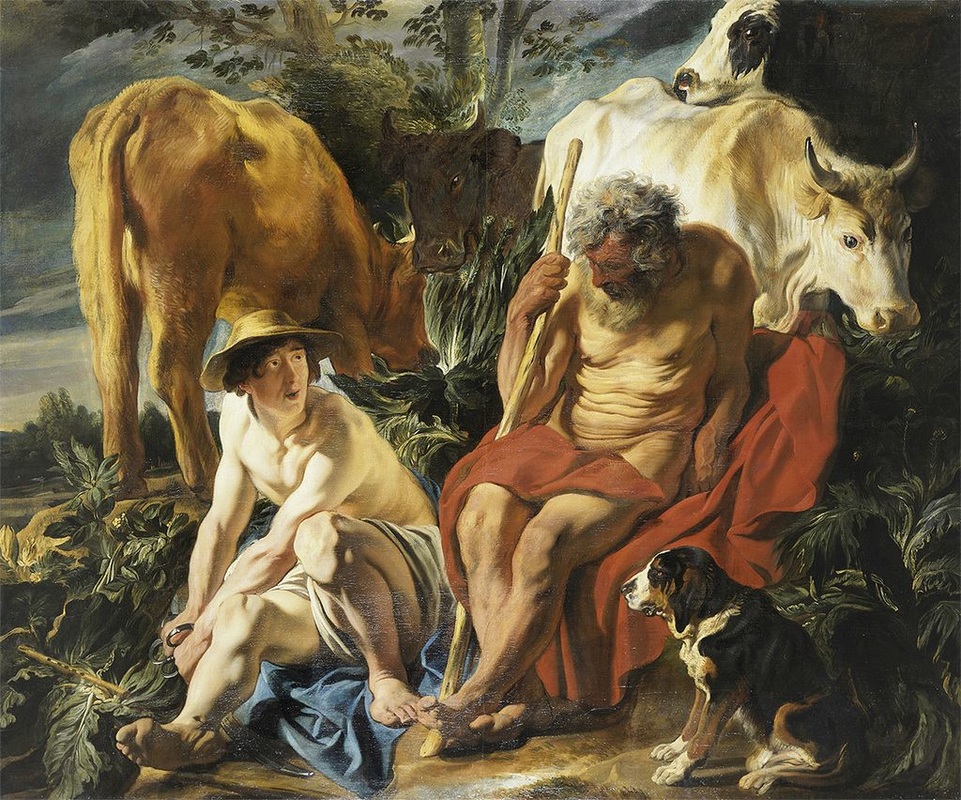Table of contents
希腊神话中的阿耳戈斯
阿古斯是希腊神话中的巨人,通常被称为阿古斯-潘诺普特斯(Argus Panoptes),以区别于神话故事中其他众多名叫阿古斯的人。
传说中,巨大的阿古斯既是英雄,又是众神的仆人,同时也是一个恶棍,最终阿古斯-帕诺普特斯死于奥林匹斯之神赫耳墨斯之手。
See_also: 希腊神话中的皮格马利翁argus Panoptes 的血统
关于阿古斯-帕诺普特斯的起源,古代文献中并没有明确的一致说法,但最常见的说法是阿古斯是女神的儿子。 盖娅 没有父亲。
在这些资料中,阿耳戈斯-潘诺普特斯的父母还有很多不同的说法,包括阿耳戈斯的创始人阿耳戈斯与奈阿德-伊斯梅内、阿耳戈斯国王的孙子阿格诺尔、阿雷斯托尔与奈阿德-迈锡尼、波塔莫伊-伊纳库斯与梅莉亚或阿吉亚(均为大洋人)。
据说,阿古斯-帕诺普特居住在伯罗奔尼撒半岛的阿戈利斯,该地区以阿古斯王的名字命名,因此阿古斯-帕诺普特可能被认为是阿古斯王的后裔。
阿耳戈斯的 100 只眼睛
阿古斯-潘诺普特斯身材魁梧,力大无穷,但与众不同的是,他有一百只看得见的眼睛。 因此,后缀 "潘诺普特斯 "的意思是 "无所不知"。 阿古斯-帕诺普特斯的眼睛有的遍布全身,有的就长在巨大的头上。 据说,由于有这么多双眼睛,阿古斯-帕诺普特斯总是醒着的,因为每次只有两只眼睛睡觉,这样就保证了 98 只眼睛一直在工作。 |
英雄 Argus Panoptes
阿古斯-帕诺普特斯作为英雄,据说杀死了一头肆虐阿卡迪亚的公牛,阿古斯后来用公牛的皮做斗篷。 阿古斯-帕诺普特斯还帮助阿卡迪亚人杀死了一个偷牛的萨提尔。
在阿戈利斯,阿古斯-帕诺普特斯(Argus Panoptes)杀死了杀害阿庇斯国王的凶手忒尔克西翁(可能是斯巴达国王)和特尔奇斯(Telchis),据说是为阿庇斯国王报了仇。
众神雇用的阿古斯-帕诺普特斯阿古斯-帕诺普特斯(Argus Panoptes)也被众神使用,在一些传说中,赫拉派巨人去杀死畸形的针鼹,因为它对路过库迈洞穴的旅行者构成威胁。 但许多其他故事对这个故事提出了质疑,因为它们说宙斯曾允许 针鼹 在她的伴侣提丰死后,她将永远生活在库迈。 赫拉虽然确实利用阿古斯-帕诺普特斯作为护卫。 赫拉几乎抓住了她的丈夫宙斯 当场 但宙斯很快就把伊奥变成了一头美丽的白色小母牛。 赫拉没有上当,她要求把这头小母牛作为礼物,宙斯当然难以拒绝。 赫拉于是任命阿古斯-帕诺普特斯为小母牛的牧人,阻止宙斯探视仙女,或将其变回仙女形态。 于是,伊奥被巨人绑在圣林中的一棵橄榄树上。 |
 赫尔墨斯和阿耳戈斯 - 雅各布-约尔丹斯(1593-1678 年) - PD-art-100
赫尔墨斯和阿耳戈斯 - 雅各布-约尔丹斯(1593-1678 年) - PD-art-100 阿古斯-帕诺普特之死
赫拉交给阿古斯-帕诺普特斯的任务最终导致了这位无所不能的巨人的死亡,因为伊奥的痛苦最终迫使宙斯拯救了他昔日的情人。
宙斯派遣他最宠爱的神子赫耳墨斯去拯救 伊奥 虽然赫耳墨斯是个神偷,但他不能就这样偷走小母牛,因为阿古斯-帕诺普特斯看到了这一切。 于是,赫耳墨斯伪装成一个牧民,走到巨人身边,坐在树荫下。
赫耳墨斯开始讲述各种神的故事,同时用他的芦笙吹奏舒缓的音乐。 日子一天天过去,轻柔的音乐让一个又一个人闭上了眼睛,睡意占据了一向清醒的阿古斯-帕诺普特斯。 最后,阿古斯-帕诺普特斯的所有眼睛都闭上了,然后赫耳墨斯动手了,他用石头杀死了巨人,或者砍下了他的头。
现在,伊奥获得了自由,但她的磨难还没有完全结束,因为赫耳墨斯无法将伊奥变回之前的仙女形态,于是伊奥变成了一头小母牛在大地上游荡,直到最后在埃及找到了庇护所。
See_also: 希腊神话中的波利卡昂在她宠爱的一个仆人死后,赫拉取下了死去的阿古斯-帕诺普特斯的眼睛,并将其放在她的神鸟孔雀的羽毛上。
 赫拉和阿古斯 - 彼得-保罗-鲁本斯(1577-1640 年) - PD-art-100
赫拉和阿古斯 - 彼得-保罗-鲁本斯(1577-1640 年) - PD-art-100 作为父亲的 Argus Panoptes
有时,阿索普斯的女儿奈阿德-伊斯梅(Naiad Ismene)称阿古斯-帕诺普特斯(Argus Panoptes)是阿尔戈斯国王伊阿索斯(Iasus)的父亲。 不过,在希腊神话中,伊阿索斯被称作许多人的儿子。
